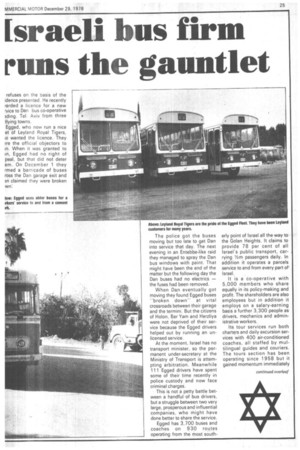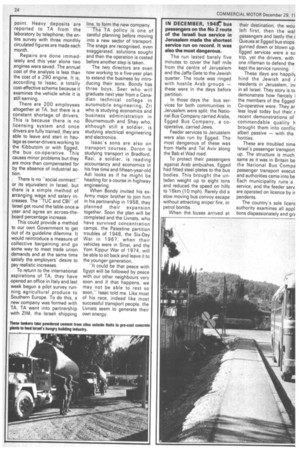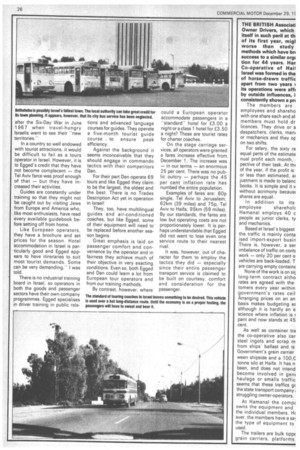Israeli bus firm runs the gauntlet
Page 27

Page 26

Page 28

If you've noticed an error in this article please click here to report it so we can fix it.
IN DECEMBER, 194C bus passengers on the No 2 route of the Israeli bus service in Jerusalem made the shortest service run on record. It was also the most dangerous.
The run lasted barely five minutes to cover the half mile from the centre of Jerusalem and the Jaffa Gate to the Jewish quarter. The route was ringed with hostile Arab groups — these were in the days before partition.
In those days the bus services for both communities in Jerusalem were split: the National Bus Company carried Arabs, Egged Bus Company, a cooperative, carried Jews.
Feeder services to Jerusalem were also run by Egged. The most dangerous of these was from Haifa and Tel Aviv along the Bab el Wad road.
To protect :their passengers against Arab ambushes, Egged had fitted steel plates to the bus bodies. This brought the unladen weight up to eight tons and reduced the speed on hills to 16km (10 mph). Rarely did a slow moving bus convoy escape without attracting sniper fire, or petrol bombs.
When the buses arrived at their destination, the wou left first, then the wal passengers and lastly the Queues at Egged bus stops gunned down or blown up. Egged services were a su trip, yet the drivers, with one rifleman to defend the kept the service running.
These days are happily hind the Jewish and residents in Jerusalem, in( in all Israel. They story is to demonstrate how fiercely I the members of the Egged Co-operative were. They ar less loyal today but their r recent demonstrations of commendable quality h brought them into conflic albeit passive — with the horities.
These are troubled time Israel's passenger transport up. The structure is much same as it was in Britain be the National Bus Compa passenger transport execut and authorities came into be Each municipality runs a service, and the feeder serv are operated on licence by ir pendents.
The country's sole licenE authority examines all appl tions dispassionately and grE: refuses on the basis of the idence presented. He recently farded a licence for a new rvice to Dan bus co-operative ding. Tel. Aviv from three tlying towns.
Egged, who now run a nice et of Leyland Royal Tigers, io wanted the licence. They ;re the official objectors to in. When it was granted to in, Egged had no right of peal, but that did not deter em. On December 1 they rmed a barricade of buses ross the Dan garage exit and an claimed they were broken ,wn:
The police got the buses moving but too late to get Dan into service that day. The next evening in an Entebbe-like raid they managed to spray the Dan bus windows with paint. That might have been the end of the matter but the following day the Dan buses had no electrics — the fuses had been removed.
When Dan eventually got moving they found Egged buses "broken down" at vital crossroads between their garage and the termini. But the citizens of HoIon, Bar Yam and Herzliya were not deprived of their service because the Egged drivers helped out by running an unlicensed service.
At the moment, Israel has no transport minister, so the permanent under-secretary at the Ministry of Transport is attempting arbitration. Meanwhile 111 Egged drivers have spent some of their time recently in police custody and now face criminal charges.
This is not a petty battle between a handful of bus drivers, but a struggle between two very large, prosperous and influential companies, who might have done better to share the service.
Egged has 3,700 buses and coaches on 930 routes operating from the most south erly point of Israel all the way to the Golan Heights. It claims to provide 78 per cent of all Israel's public transport, car. rying 1/2m passengers daily. In addition it operates a parcels service to and from every part of* Israel.
It is a co-operative with 5,000 members who share equally in its policy-making and profit. The shareholders are also employees but in addition it employs on a salary-earning basis a further 3,300 people as drivers, mechanics and administrative workers.
Its tour services run both charters and daily excursion services with 400 air-conditioned coaches, all staffed by multilingual guides and couriers. The tours section has been operating since 1958 but it gained momentum immediately after the Six-Day War in June 1967 when travel-hungry Israelis went to see their "new territories."' In a country so well endowed with tourist attractions, it would be difficult to fail as a tours operator in Israel. However, it is to Egged's credit that they have not become complacent — the Tel Aviv farce was proof enough of that — but they have increased their activities.
Guides are constantly under training so that they might not be caught out by visiting Jews from Europe and America who, like most enthusiasts, have read every available guidebook before setting off from home.
Like European operators,
they have a brochure and set prices for the season. Hotel accommodation in Israel is particularly good and Egged appears to have itineraries to suit most tourist demands. Some can be very demanding,I was told.
There is no industrial training board in Israel, so operators in both the goods and passenger sectors have their own company programmes. Egged specialises in driver training in public rela tions and advanced language courses for guides. They operate a five-month tourist guide course • to ensure peak efficiency.
Against the background it seems inconceivable that they should engage in commando tactics with their competitors Dan.
For their part Dan operate 69 tours and like Egged they claim • to be the largest, the oldest and the best. There is no Trades Description Act yet in operation in Israel!
They, too, have multilingual guides and air-conditioned coaches, but like Egged, some of their equipment will need to be replaced before another season begins.
Great emphasis is laid on passenger comfort and convenience by the operator and in fairness they achieve much of their objective in very exacting conditions. Even so, both Egged and Dan could learn a lot from European tour operators and from our training methods.
By contrast, however, where could a European operator accommodate passengers in a "standard" hotel for £3.00 a night or a class 1 hotel for £3.50 a night? These are tourist rates for charter coaches.
On the stage carriage services, al! operators were granted a fares increase effective from. December 1. The increase was — in our terms — an enormous 25 per cent. There was no public outcry — perhaps the 45 per cent inflation rate has numbed the entire population.
Examples of fares are: 60p single, Tel Aviv to Jerusalem, 62km (39 miles) and 75p, Tel Aviv to Haifa, 95km (59 miles). By our standards, the fares are low but operating costs are not proportionately lower, It is perhaps understandable that Egged did not want to lose even one service route to their nearest rival.
It was, however, out of character for them to employ the tactics they did — especially since their entire passenger transport service is claimed to be built on courtesy, comfort and consideration for the passenger.




































































